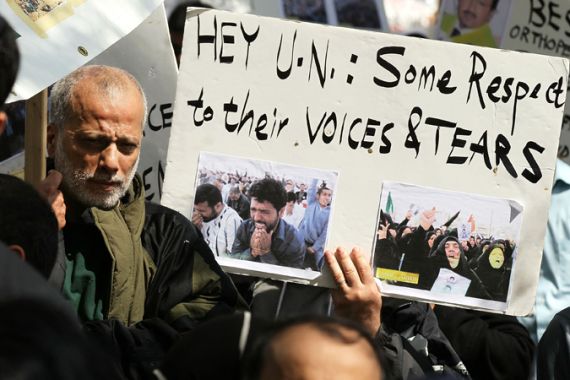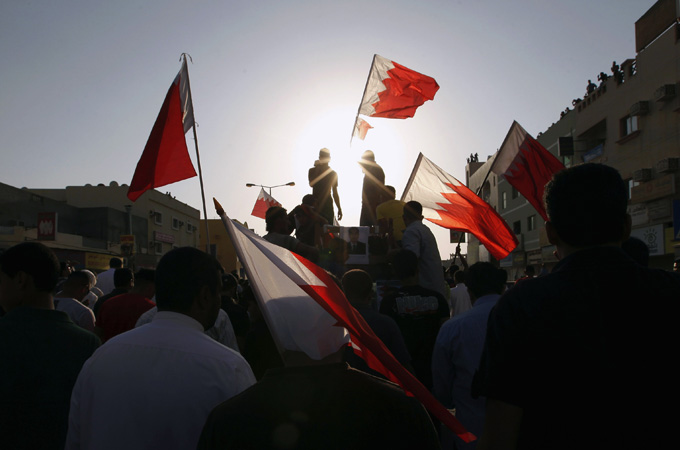Bahraini activists: Seeking refuge in a storm
Many opponents of the island nation’s ruling family fear retribution and are claiming asylum in Europe.

 |
| Bahrani activists are closely watching how events unfold in Egypt [Reuters] |
For a while, it seemed like there might be havens in the Arab world for political activists, especially in countries where there was either no uprising to start with, or where populist revolutions seemed to have succeeded, as in Tunisia and Egypt.
But things have not been that simple. Tunisia denied visas to 11 Palestinians wanting to attend a bloggers’ conference there in October, while Syrians have been harassed and even kidnapped in Lebanon. And now, Bahraini activists, including those who contributed to the Egyptian revolution, say they don’t necessarily feel safe there.
And just as Lebanon’s close ties with Syria are causing problems for Syrian activists there, Bahrainis worry that Egypt’s historically strong ties with Bahrain might lead to problems for them.
“You know, in Egypt and all Arab countries, police can catch you and give you to Bahrain,” Falah Ahmed Rabeea, a Bahraini activist, told Al Jazeera.
“The Egyptian police might give them our names or our information to Bahrain – maybe they were watching me, I don’t know. I did not feel safe.”
This unease has its roots in the relationships between Arab states and their leaders, in this case Bahrain’s King Hamad bin Isa al-Khalifa, and Egypt’s deposed President, Hosni Mubarak. Although Mubarak is no longer in power, Egypt’s ruling military has strong ties to his regime. The Bahraini ruler even visited Mubarak at the World Medical Centre in Cairo, where he is under medical care.
|
“This is frightening every human rights defender in the Arab world – how will they be treated in Egypt?“ – Nabeel Rajab, president of Bahrain Center for Human Rights |
These close ties are also evident in how and where embattled leaders seek asylum at the end of their rule.
Before his fall, Mubarak was rumoured to have gone to Bahrain (among other places); Saudi Arabia rolled out the red carpet for Tunisia’s deposed President Zine Abedine Ben Ali and Reuters on Monday quoted Jeffrey Feltman, the US assistant secretary of state, as saying that some Arab leaders (he declined to name names) would welcome Syrian President Bashar al-Assad.
The Egyptian government has in the past denied entry to Bahraini activists and blocked human rights websites set up by Bahraini activist groups. The UAE also has a record of suddenly deporting hundreds of Shia families,”without receiving an explanation or an opportunity to appeal the decision”, according to rights group Human Rights Watch.
It seems possible that a form of pan-Arabism, on a civilian scale, will ultimately prevail, but for now, no one is really breathing easy.
Murtadha, a Bahraini activist who fled to the UK via Dubai in April, said that he did not feel safe emigrating to any other Arab country (with the possible exception of Oman, he stipulated).
“Because what do you expect from Dubai or Saudi?” said Murtadha, who wished to be identified by only his first name.
“If they [Bahraini authorities] want me, they’re going to put me back on a plane and send me back to Bahrain.”
Murtadha has been told by a family member that Bahraini authorities are now looking for him.
The 28-year-old aircraft engineer has a history with law enforcement that goes back as far as 1995, when he was arrested at the age of 12 for writing anti-state graffiti on walls. They kept him for three days, beat him and threatened to rape him if he didn’t say that Iranian agents had put him up to the graffiti.
A way out
Egypt was not even Rabeea’s first choice for a place to go. He first tried going to Kuwait, but was denied entry because he was named on an order provided by the Bahraini government.
An education resource specialist at the Ministry of Education and a lecturer at the Arab Open University, Rabeea said he was arrested because he was a member of the Bahrain Teacher’s Society, a group that became active in the protests last winter.
“We had meetings and discussions as a civil society – and after February 14, the government banned this society. And then they arrested everyone in the group – the leaders, the members, every man and woman.”
Rabeea himself was arrested on March 29 and kept for one week, which may seem like a relatively short period of incarceration in comparison with how long others are jailed in Bahrain – but those seven days left their mark.
He said he was kept standing and blindfolded most of the time, was only allowed to sleep two hours each night and was beaten multiple times each day, with a pipe.
He said he was “kicked like a football” repeatedly or was headbutted by security guards, especially when he tried to speak to his cellmates, one of whom was Ali Mirza, a prominent athlete and member of the national handball team who along with his teammate and brother Mohammed Mirza, were sentenced to 15 years in prison via military tribunal in September.
In addition to the beatings, there were also humiliation tactics, from being forced to chant pro-government slogans to being ordered to bray like a donkey.
“Sometimes he [the guard] would only come in to say, ‘speak like a donkey’ – and he gave me a good lesson on this with his fist and his feet because I told him that I don’t know how to make that noise.”
He said he was released without charges, but that he nonetheless received a notice to appear before a military court, although his court date has now been delayed until December 12. Rabeea said he will not be there.
“I don’t think it’s safe for me to go back to Bahrain [or] even Egypt now,” said Rabeea.
‘Frightening’ prospects
The fact that Bahrain’s ruler was even received by the Egyptian authorities after the revolution is an unsettling sign to those who worry about how the ruling military party will deal with pro-democracy activists in months to come.
Nabeel Rajab, president of the Bahrain Centre for Human Rights said he was “shocked” that the Bahraini king, one of Mubarak’s strongest supporters, was welcome.
| Watch Al Jazeera’s documentary Shouting in the Dark |
“A revolution has happened. The government in Egypt should represent the revolution,” said Rajab. “This is frightening every human rights defender in the Arab world – how will they be treated in Egypt?”
Still, as a region, Rajab said that the Arab world is still tied to security agreements, which he said, “unfortunately do not target terrorists or criminals, but human defenders, human rights activists and members of peaceful political opposition”.
Even rights activists who are free in Bahrain, said Rajab, are harassed in other countries or simply turned away at airports when they arrive.
Rajab himself said he’s been interrogated or questioned in Egypt, Jordan, Dubai and Saudi Arabia and also been Yemen and is banned from travelling to Kuwait.
The aim of this sort of loosely co-ordinated regional harassment, he said, is to drive activists away from the Middle East, scattering them across Europe.
“That’s the whole aim – to get them far away from the region – they harass them here or there so they can’t stay.”
An uncertain sanctuary
Well-known Bahraini activists such as Hussain Yousif, who have been participating in the Egyptian revolution, are on slightly more stable footing there.
Yousif is the Middle East and North Africa coordinator of the Bahrain Press Association. He told Al Jazeera: “My friends know me, they protect me. But others are unknown, and Egyptian can misbehave toward a Bahraini they don’t know if someone told them to do so,” he said.
“Many Bahrainis come here, but they cannot stay here. They don’t have a system here…but also they cannot explain to the authorities why they are here, so they could get sent back. This is possible, if the revolution fails in Egypt.”
Yousif, whose background is in the technology sector, took off from Bahrain to Egypt after the Egyptian government cut off access to internet and mobile services.
The 30-year-old has remained there since the end of January, severing all communications with his family back home, in order to minimise any risk to their security, and using his base in Cairo to spread the word about government crackdowns in Bahrain.
“Me and my friends, we wanted to go and help the Egyptian people connect to the internet, to each other – and I have participated with them in their revolution … and this revolution must succeed,” said Yousif.
“I am counting on it, in fact.”
Yousif mentions the case of a Syrian activist who was recently beaten in Cairo by other Syrians to make his point.
“I was wondering, if a person like that, who is against [the] Syrian regime, and also [the] Iranian regime and also against [the] Saudi regime – if he lost his other country, Egypt, where else can he be? Shall he be living outside the Arab world? Shall he be living only in Europe?”
Despite feeling like he has some protection from Egyptian activists, Yousif realises that many of them, such as his friend Alaa Abd el Fattah, who has been imprisoned for two weeks, are also facing similar security measures. But things are still worse back home.
His friend, blogger Ali Abdulemam, was imprisoned in Bahrain, then freed, and is now missing (he was sentenced, in absentia, to 15 years in prison in June). Yousif is almost certain he will face a similar fate.
“There are a number of possible scenarios … but I think that I would probably arrive at the airport, then maybe disappear for a while, get released and then later charged with something or disappear,” said Yousif, adding that he’d rather get arrested in Egypt.
“If I get arrested and get sent back to Bahrain, at least then my arrest will be a sign to the Egyptian people that their revolution did not work,” said Yousif.
“And I’m willing to be that sign.”